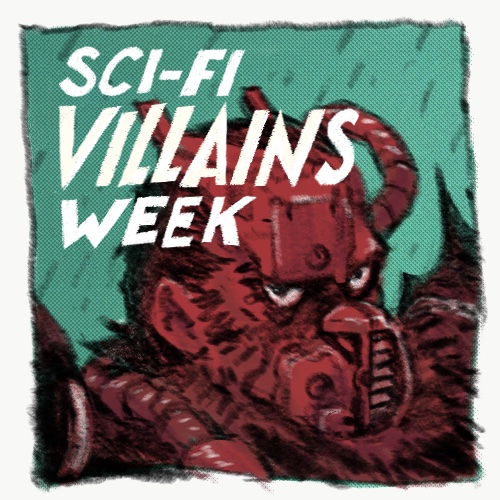The villainous Zorg’s small stature in The Fifth Element does not stand in the way of his big dreams. “If you want something done,” he mutters partway through the film, “do it yourself.” Though evil, murderous, and selfish, the guy makes a point.
Villains in science fiction have the privilege of being bigger than life, while characters anchored firmly in our own reality run the risk of overinflating their own importance and ability to cause mayhem. Take Ivan Drago in Rocky IV. He might symbolically represent the Soviet side of the Cold War, but in actuality he is only a physical threat to a few people overall, and in a generally contained platform. But Agent Smith in The Matrix is a threat to humanity and human consciousness for all people everywhere, a stand-in for the Matrix itself and all of its grand possibilities of destruction.

In space, no one can hear you scream — but that doesn’t stop an evil-doer from trying. This week, Polygon celebrates all forms of sci-fi villainy because someone has to (or else).
This brings us to Zorg. Masterfully overacted by Gary Oldman in Luc Besson’s 1997 science fiction space opera, Zorg is the perfect example of what happens when middle management gets a little too drunk with limited power.
In The Fifth Element, Zorg is an errand boy for the great big evil force that tries to destroy life across the universe every 5,000 years. On Earth, Zorg is the head of a massive corporation. He flippantly lays off a million of his workers in one of his first appearances on screen, which includes the film’s hero, cab driver Korben Dallas (Bruce Willis). His overall lack of interest in other people’s emotional well-being is evident, but he does have a certain streak that advocates for the financial well-being of others. This is not to say he is at all looking out for anyone but himself, but he makes an argument in favor of energizing the economy through chaos and destruction.
Aside from his selfishness, Zorg seems to be guided by French economist Claude-Frédéric Bastiat’s parable of the broken window, the same argument over 100 years prior to The Fifth Element. If a window is unbroken, no business is being created, and no goods and services exchanged. But when a window is broken, suddenly there are glaziers, suppliers, and drivers working to fix the problem. Each of them is getting paid, which drives more money into the economy. Zorg tries to make the exact same case in the movie using a drinking glass and automated vacuums (which felt futuristic in 1997). Though this economic parable is widely considered a fallacy, within Zorg’s little world, that type of chaos would actually make a lot of profit for him.
:no_upscale()/cdn.vox-cdn.com/uploads/chorus_asset/file/24415550/fifth_element_1997__4372.jpeg)
Image: Gaumont
As we see later, one of Zorg’s many industries is weapons. What better way for him to sell more arms than to create chaos and destruction across the entire galaxy? Ignoring the lives lost and suffering, which Zorg is most certainly ignoring, this plan of his to aid the big baddie in this scheme might just make him and his work associates a lot of money.
Zorg is not the only villain to have a fair amount of logic behind his motivation for his evil deeds. Killmonger (Michael B. Jordan) in Black Panther is one of the more recent adversaries to be seen as in the right. He comes to Wakanda to challenge the crown, but does so lawfully and within not only the customs of that country but the ethical basis for his claim. Killmonger was raised away from his blood right and is only returning to right a wrong against him. Were the story of Wakanda told from his perspective, Killmonger could be shaded as the hero and T’Challa (Chadwick Boseman) the man unlawfully on the throne of the advanced African nation. But Killmonger fights for what he is owed solely on a personal level. He is driven by a feeling of justice and only wants what should be his. He is not seeking to change the world or destroy anything, other than T’Challa’s world.
A more apt MCU comparison to Zorg is Thanos. He too sought a large-scale elimination of life across the universe (50% to be exact), but his reasons for doing so were a bit handwavey. True, resources might have been sparse in certain places, but he assumes that these depleted reserves were widespread enough to justify such extreme means. And why did he care so much? He tries to make folks believe that he is such a protector of life that he alone sees the need to make a big decision to protect it, but no one appointed him the guardian of the galaxy.
On the other gauntlet-free hand, Zorg is acting unabashedly for himself. He is invested in this ploy to generate more money and never feels the need to apologize or ever make up an alternate argument. Zorg wants what he wants, and he is willing to help the big evil force to get it.
In the end, things don’t turn out so great for Zorg. While he thinks he is the victor in the battle to control the universe, that he can do the bidding for the big baddie and smile all the way to the bank, he is sorely mistaken. Ultimately his cockiness and underestimation of all the folks around him lead to him blowing up just as he thinks he has won. Zorg’s demise makes way for a happy ending to the movie, but it doesn’t necessarily mean that he was completely wrong.
Zorg’s motivations are clearer than Thanos’, and yet not any smaller in scope. Both these villains want widespread havoc and massive species loss, but Zorg’s reasoning is more believable and understandable. And he does all that in great style.

